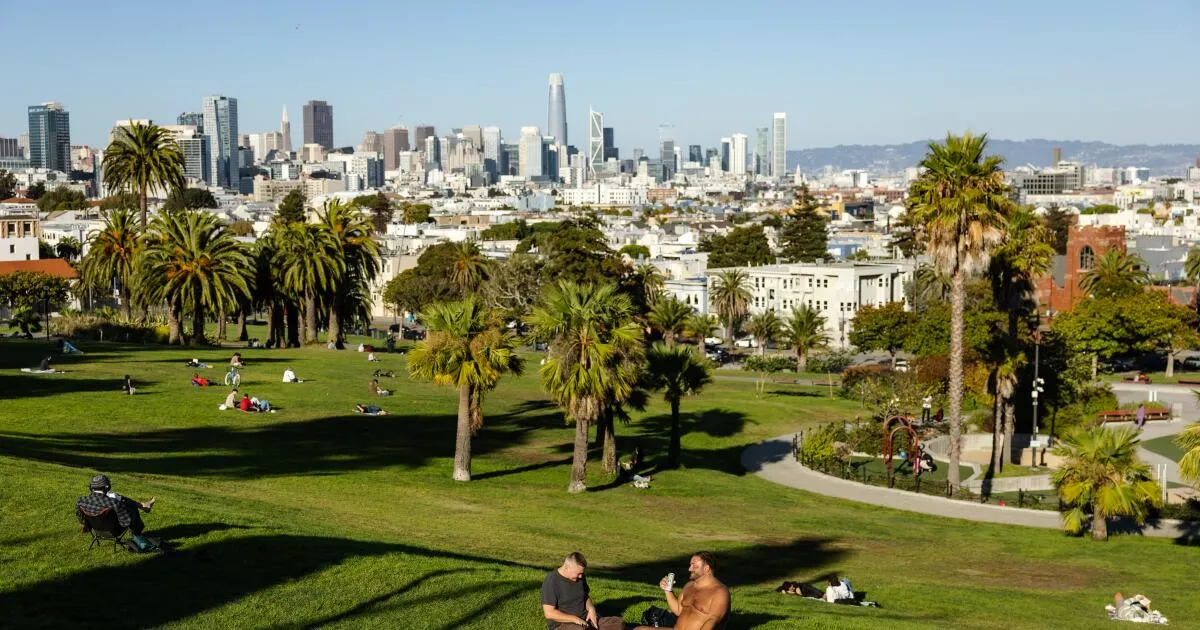
Approximately 24 hours after former President Donald Trump labeled San Francisco a crime-ridden “mess” and suggested deploying federal forces to restore order, local residents expressed skepticism towards his claims. Manit Limlamai, 43, and Kai Saetern, 32, both professionals in the software industry, were enjoying a sunny day at Dolores Park, a popular green space offering stunning views of downtown San Francisco. The park was bustling with activity, as people read books, flew kites, and played with their dogs under a clear blue sky. Limlamai and Saetern acknowledged that while San Francisco has its challenges, including some rough neighborhoods, they feel safe in the city. Saetern remarked, “I’ve lived here for 10 years and I haven’t felt unsafe,” emphasizing that every city has its issues but noting, “it’s not a hellscape.”
Limlamai found Trump’s suggestion of troop deployment alarming, especially following his comments about American cities serving as “training grounds” for U.S. military forces. He stated, “I don’t think that’s appropriate at all. The military is not trained to do what needs to be done in these cities.” This sentiment was echoed by other residents, visitors, and local leaders, who expressed strong opposition to the idea of federal troops in San Francisco. Many acknowledged the city’s problems, particularly homelessness, but firmly rejected the notion of military intervention.
Peter Hill, 81, was playing chess in a nearby park when he called Trump’s proposal “more of Trump’s insanity,” labeling the use of troops domestically as a “fascist power play.” Local activist Wendy Aragon shared similar concerns, expressing fear for her Latino community, which she feels is already under attack. “My community is under attack right now,” she stated, highlighting the risks posed by the potential presence of federal troops.
State Senator Scott Wiener (D-San Francisco) condemned the idea of troop deployment, calling it “completely unnecessary” and typical of Trump’s “petty, vindictive retaliation.” He noted that Trump targets cities he perceives as enemies, pointing to previous comments about Los Angeles and Chicago. Wiener criticized the president's claims regarding local officials requesting assistance, labeling it misleading.
In contrast, Abigail Jackson, a White House spokesperson, defended the potential deployment of federal troops, citing crime reductions in other cities like Washington, D.C., and Memphis. “America’s once great cities have descended into chaos and crime as a result of Democrat policies,” she claimed, urging San Francisco Democrats to consider the results seen in other areas.
San Francisco, known for its liberal politics, has often been criticized by conservatives who claim it has fallen victim to destructive progressive policies. The city’s economy, heavily reliant on the tech industry, has suffered due to the pandemic and the shift towards remote work, further tarnishing its image. This backdrop has made San Francisco a target for Trump, who has previously suggested federal intervention in the city. In previous statements, he claimed that Democrats had “destroyed” San Francisco and promised to clean it up.
Notably, billionaire Marc Benioff, founder of Salesforce, initially supported the idea of federal troops, stating, “We don’t have enough cops, so if they can be cops, I’m all for it.” However, he later apologized for his comments after receiving backlash from the community.
San Francisco’s new mayor, Daniel Lurie, has pointed out that crime is down 30% citywide, with homicides at a 70-year low. He emphasized the need for local law enforcement to address these issues without federal interference. Dist. Atty. Brooke Jenkins took a more combative stance, declaring her readiness to prosecute federal officers who might unlawfully harass residents.
Prominent local figures, including Rep. Nancy Pelosi (D-San Francisco), have publicly rejected Trump’s suggestions, asserting that the city does not require his “chaos.” California Governor Gavin Newsom also denounced the potential deployment of federal troops, labeling it a clear violation of federal law, and vowed to challenge any such actions in court.
As large crowds gathered for events like the Dreamforce convention, local residents shared mixed opinions about the state of safety in San Francisco. Some acknowledged the visible issues related to homelessness and urban decay but rejected the idea that these warranted military intervention. Sanjiv, a tech worker, remarked that while homelessness is a significant problem, the city is not “under siege.”
Claire Roeland, a visitor from Austin, Texas, expressed concern about the city’s condition but also noted that “there isn’t any realistic need to send in federal troops.” She highlighted the importance of addressing the root causes of the visible struggles without resorting to military solutions.
In summary, the proposal to deploy federal troops in San Francisco has ignited a passionate debate among residents and local leaders. While acknowledging the city’s challenges, many firmly believe that military intervention is not the answer to addressing issues like homelessness and urban decay.